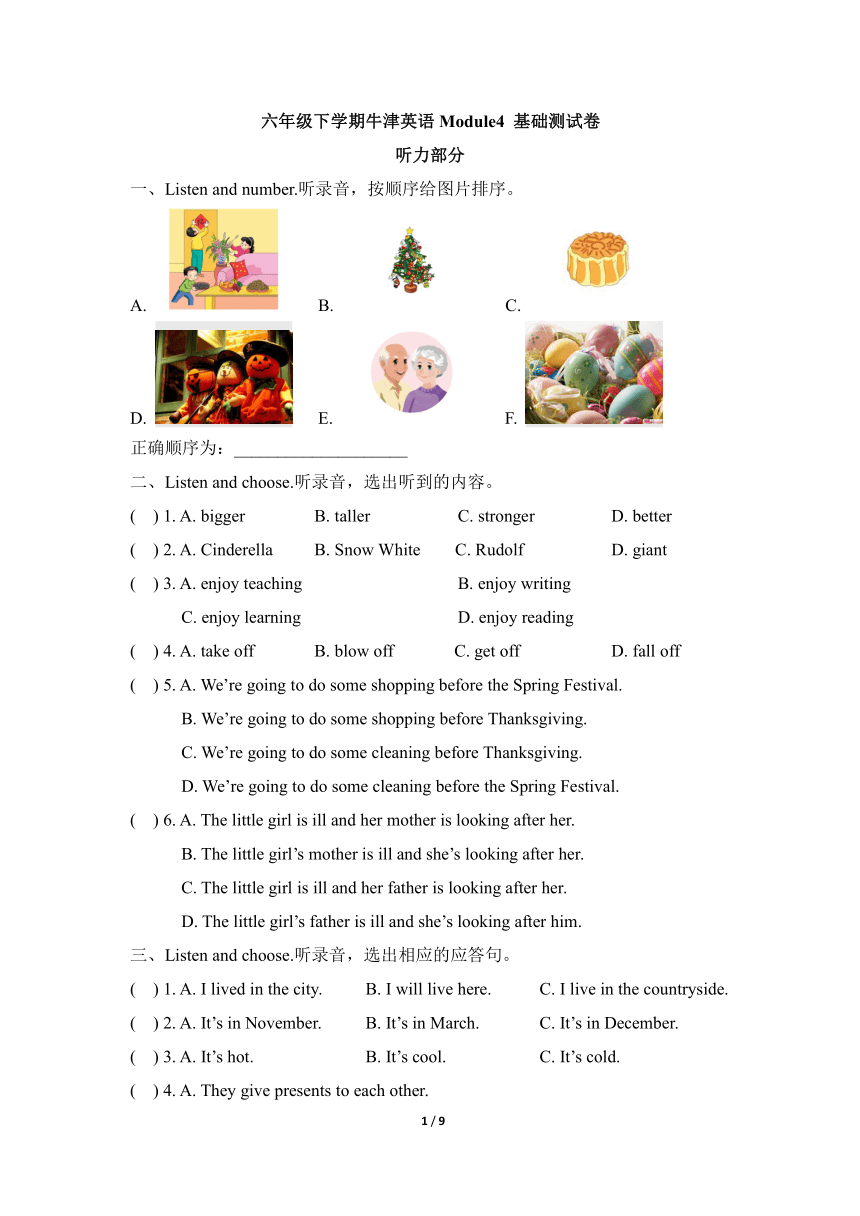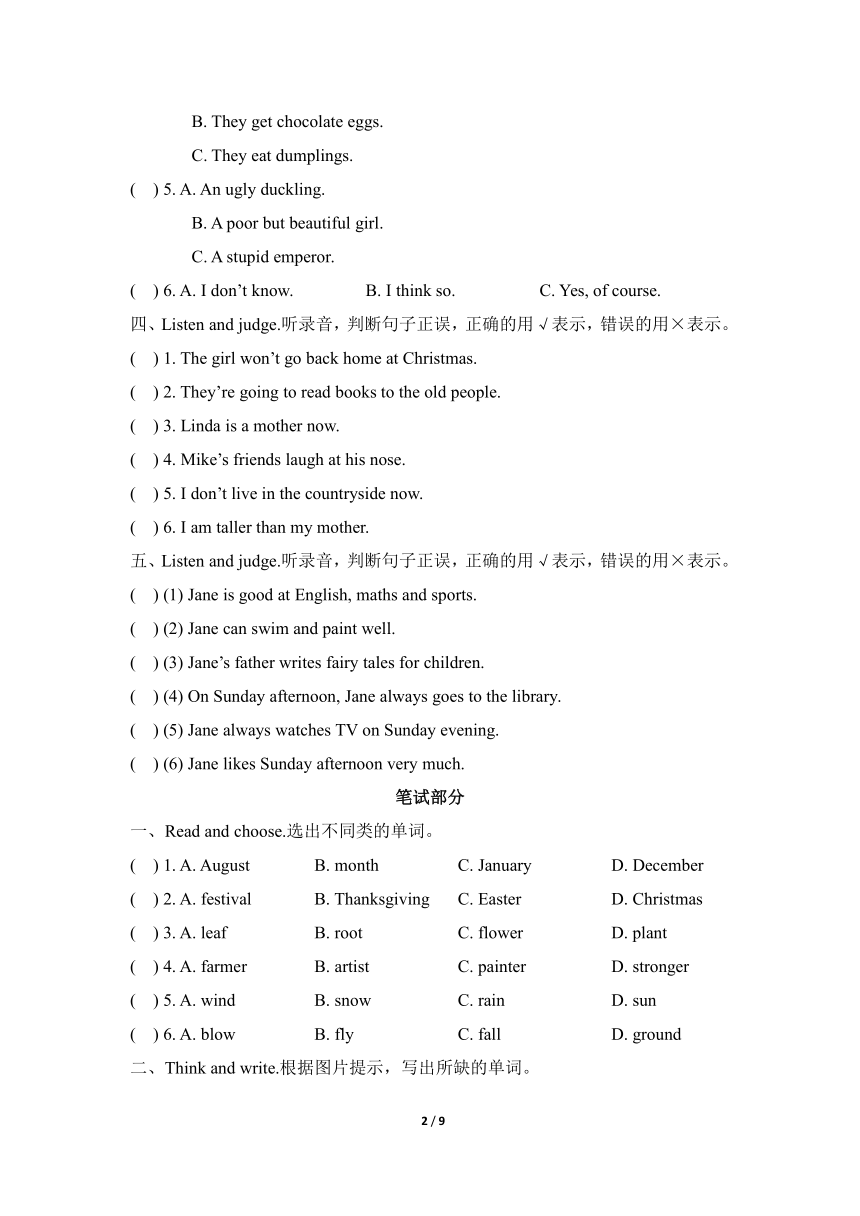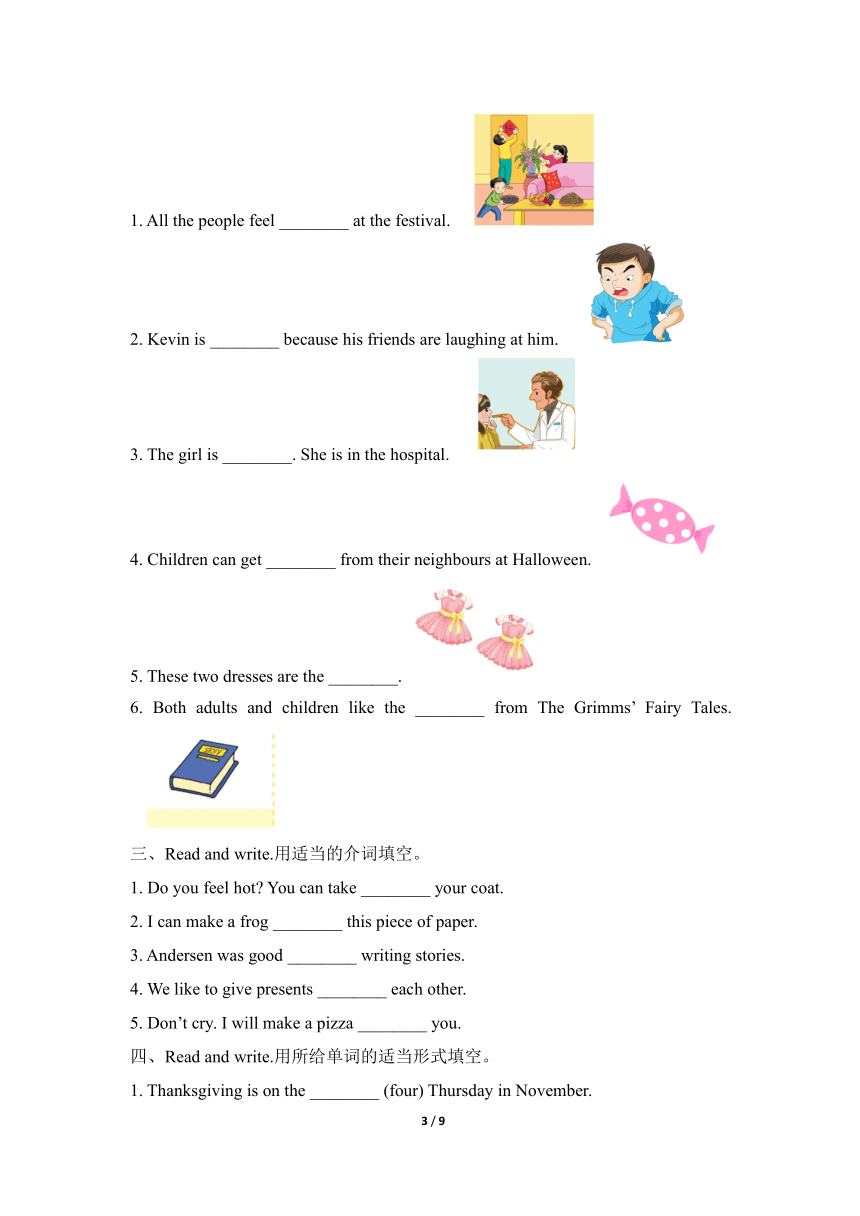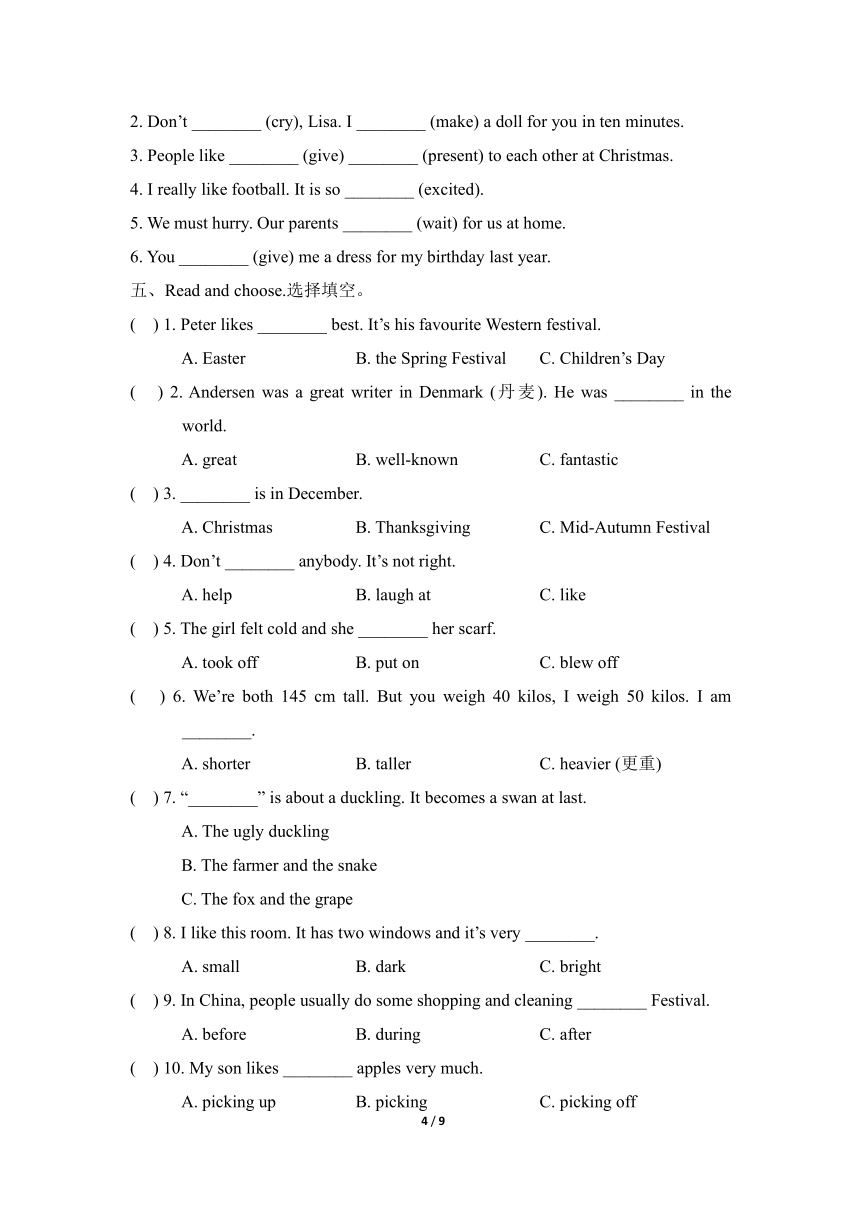六年级下学期牛津英语 Module 4 基础测试卷(含答案及听力书面材料 无音频)
文档属性
| 名称 | 六年级下学期牛津英语 Module 4 基础测试卷(含答案及听力书面材料 无音频) |

|
|
| 格式 | zip | ||
| 文件大小 | 1.1MB | ||
| 资源类型 | 教案 | ||
| 版本资源 | 牛津沪教版 | ||
| 科目 | 英语 | ||
| 更新时间 | 2019-01-24 17:49:47 | ||
图片预览




文档简介
六年级下学期牛津英语Module4 基础测试卷
听力部分
一、Listen and number.听录音,按顺序给图片排序。
A. B. C.
D. E. F.
正确顺序为:____________________
二、Listen and choose.听录音,选出听到的内容。
( ) 1. A. bigger B. taller C. stronger D. better
( ) 2. A. Cinderella B. Snow White C. Rudolf D. giant
( ) 3. A. enjoy teaching B. enjoy writing
C. enjoy learning D. enjoy reading
( ) 4. A. take off B. blow off C. get off D. fall off
( ) 5. A. We’re going to do some shopping before the Spring Festival.
B. We’re going to do some shopping before Thanksgiving.
C. We’re going to do some cleaning before Thanksgiving.
D. We’re going to do some cleaning before the Spring Festival.
( ) 6. A. The little girl is ill and her mother is looking after her.
B. The little girl’s mother is ill and she’s looking after her.
C. The little girl is ill and her father is looking after her.
D. The little girl’s father is ill and she’s looking after him.
三、Listen and choose.听录音,选出相应的应答句。
( ) 1. A. I lived in the city. B. I will live here. C. I live in the countryside.
( ) 2. A. It’s in November. B. It’s in March. C. It’s in December.
( ) 3. A. It’s hot. B. It’s cool. C. It’s cold.
( ) 4. A. They give presents to each other.
B. They get chocolate eggs.
C. They eat dumplings.
( ) 5. A. An ugly duckling.
B. A poor but beautiful girl.
C. A stupid emperor.
( ) 6. A. I don’t know. B. I think so. C. Yes, of course.
四、Listen and judge.听录音,判断句子正误,正确的用√表示,错误的用×表示。
( ) 1. The girl won’t go back home at Christmas.
( ) 2. They’re going to read books to the old people.
( ) 3. Linda is a mother now.
( ) 4. Mike’s friends laugh at his nose.
( ) 5. I don’t live in the countryside now.
( ) 6. I am taller than my mother.
五、Listen and judge.听录音,判断句子正误,正确的用√表示,错误的用×表示。
( ) (1) Jane is good at English, maths and sports.
( ) (2) Jane can swim and paint well.
( ) (3) Jane’s father writes fairy tales for children.
( ) (4) On Sunday afternoon, Jane always goes to the library.
( ) (5) Jane always watches TV on Sunday evening.
( ) (6) Jane likes Sunday afternoon very much.
笔试部分
一、Read and choose.选出不同类的单词。
( ) 1. A. August B. month C. January D. December
( ) 2. A. festival B. Thanksgiving C. Easter D. Christmas
( ) 3. A. leaf B. root C. flower D. plant
( ) 4. A. farmer B. artist C. painter D. stronger
( ) 5. A. wind B. snow C. rain D. sun
( ) 6. A. blow B. fly C. fall D. ground
二、Think and write.根据图片提示,写出所缺的单词。
1. All the people feel ________ at the festival.
2. Kevin is ________ because his friends are laughing at him.
3. The girl is ________. She is in the hospital.
4. Children can get ________ from their neighbours at Halloween.
5. These two dresses are the ________.
6. Both adults and children like the ________ from The Grimms’ Fairy Tales.
三、Read and write.用适当的介词填空。
1. Do you feel hot? You can take ________ your coat.
2. I can make a frog ________ this piece of paper.
3. Andersen was good ________ writing stories.
4. We like to give presents ________ each other.
5. Don’t cry. I will make a pizza ________ you.
四、Read and write.用所给单词的适当形式填空。
1. Thanksgiving is on the ________ (four) Thursday in November.
2. Don’t ________ (cry), Lisa. I ________ (make) a doll for you in ten minutes.
3. People like ________ (give) ________ (present) to each other at Christmas.
4. I really like football. It is so ________ (excited).
5. We must hurry. Our parents ________ (wait) for us at home.
6. You ________ (give) me a dress for my birthday last year.
五、Read and choose.选择填空。
( ) 1. Peter likes ________ best. It’s his favourite Western festival.
A. Easter B. the Spring Festival C. Children’s Day
( ) 2. Andersen was a great writer in Denmark (丹麦). He was ________ in the world.
A. great B. well-known C. fantastic
( ) 3. ________ is in December.
A. Christmas B. Thanksgiving C. Mid-Autumn Festival
( ) 4. Don’t ________ anybody. It’s not right.
A. help B. laugh at C. like
( ) 5. The girl felt cold and she ________ her scarf.
A. took off B. put on C. blew off
( ) 6. We’re both 145 cm tall. But you weigh 40 kilos, I weigh 50 kilos. I am ________.
A. shorter B. taller C. heavier (更重)
( ) 7. “________” is about a duckling. It becomes a swan at last.
A. The ugly duckling
B. The farmer and the snake
C. The fox and the grape
( ) 8. I like this room. It has two windows and it’s very ________.
A. small B. dark C. bright
( ) 9. In China, people usually do some shopping and cleaning ________ Festival.
A. before B. during C. after
( ) 10. My son likes ________ apples very much.
A. picking up B. picking C. picking off
六、Rewrite the sentences.按要求改写下列句子。
1. Children usually get chocolate eggs at Easter. (对划线部分提问)
_____________________________________________________________________
2. Mr. Brown is reading a story to the children. (对划线部分提问)
_____________________________________________________________________
3. My favourite fairy tale is “Snow White”. (对划线部分提问)
_____________________________________________________________________
4. Sam helped his mother with the housework this morning. (对划线部分提问)
_____________________________________________________________________
5. I will visit my aunt this Christmas. (另写一句,但意思不变)
_____________________________________________________________________
6. Yes, you must make a jack-o’-lantern. (写出问句)
_____________________________________________________________________
7. the, was, flew, angry, and, bird, away, (.) (连词成句)
_____________________________________________________________________
七、Read and match.(读一读,把问答句配对。
(1) Will we get together this Christmas? A. The weather? It was cold but it didn’t snow.
(2) Was it cold and snowy? B. Of course not! Yesterday was my son’s birthday.
(3) Would you like to go shopping with me? C. I felt very excited. I really like football games.
(4) Were you at the office? D. Of course! And we’ll eat a big dinner together!
(5) How did you feel? E. I don’t know. Let me ask my mother.
(6) When is the Spring Festival? F. Of course! I must do the holiday shopping!
八、Read and choose.读一读,选择适当的句子完成对话。
A. We watch the bright moon at night. B. What do you do? C. We can get candy from them. D. I like Mid-Autumn Festival best. E. What festival do you like best? F. The weather is cool.
Peter: Hi, Linlin. What’s your favourite festival?
Linlin: (1) ________
Peter: Mid-Autumn Festival? When is it?
Lirlin: It’s usually in September or October. (2) ________
Peter: What do you do at the festival?
Lidin: We eat mooncakes. (3) ________
Peter: Sounds interesting.
Lilin: How about you? (4) ________
Peter: I like Halloween. It’s fun.
Lilin: Really? (5)________
Peter: We make jack-o’-lanterns and play “trick or treat” at night.
Lnlin: A game?
Peter: We knock our neighbours’ doors and say “Trick or treat?”
Linlin: Why do you do this?
Peter: (6) ________
Lilin: Wow! That’s really interesting!
九、Writing.书面表达。
请你回想一下你去年是如何过春节的?至少写六句。
____________________________________________________________________________________________________________________________________________________________________________________________________________________________________________________________________________________
参考答案
听力部分
听力材料
一、
1. It’s a Chinese festival. It’s usually in September or October. People usually eat mooncakes and watch the moon in the evening.
2. It’s a Chinese festival. It’s in autumn. People often go climbing mountains and visit old people.
3. It’s a Western festival. It’s in December. It’s a very important festival in Western countries. People give presents to each other.
4. It’s a Western festival. It’s on the last day of October. Children can get candy from their neighbours.
5. It’s a Western festival. It’s in March or April. Children usually get chocolate eggs.
6. It’s the most important festival in China. Family members get together and have a big dinner. People usually eat dumplings.
二、
1. If you do more exercises, you will be better and better.
2. The giant didn’t let the children play in his garden.
3. My parents are good teachers. They both enjoy teaching.
4. You should get off at the next stop.
5. We’re going to do some shopping before Thanksgiving.
6. The little girl’s mother is ill and she’s looking after her.
三、
1. Where will you live in the future?
2. When’s Thanksgiving?
3. How’s the weather during the Spring Festival?
4. What do people usually do on Christmas Eve?
5. What is the story “Cinderella” about?
6. Are you going to read stories this week?
四、
1. I’m sorry, Mummy. But I’m really busy. I can’t come back home this Christmas.
2. So, let’s buy some books for the old people. I think they will like them.
3. When Linda was a little girl, her mother always told her fairy tales. Now Linda tells her daughter stories every day.
4. Mike is crying because nobody likes his big red nose. They say it’s ugly.
5. I will still live in the countryside in the future. I love here.
6. My mother is 160 cm tall, but I am 166 cm tall now.
五、
Jane is a primary school student. She is 11 years old. She is good at English, maths and sports. She is good at swimming and painting. She likes reading very much. Every Sunday afternoon, she goes to the library with her parents. Her mother is a writer. She writes fairy tales for children. Her father is a teacher. He teaches Chinese in a middle school. They usually read books in the library all afternoon. Then they borrow some books. Before they go home, they always go to a restaurant to eat something. After they get home, they wash themselves first. After that, sometimes they watch TV, and sometimes they play chess. Sunday afternoon is a happy time for Jane.
听力答案
一、
CEBDFA
二、
1-6 DDACBB
三、
1-6 BACABC
四、
1-6 √×√√×√
五、
(1)-(6) √√×√×√
笔试部分
一、
1-6 BADDDD
二、
1. happy 2. angry 3. ill 4. candy / sweets 5. same 6. stories
三、
1. off 2. with 3. at 4. to 5. for
四、
1. fourth 2. cry, will make 3. giving, presents 4. exciting 5. are waiting 6. gave
五、
1-5 ABABB 6-10 CACAB
六、
1. What do children usually get at Easter?
2. What is Mr. Brown reading to the children?
3. What is your favourite fairy tale?
4. What did Sam do this morning?
5. I am going to visit my aunt this Christmas.
6. Must I make a jack-o’-lantern?
7. The bird was angry and flew away.
七、
(1)-(6) DAFBCE
八、
(1)-(6) DFAEBC
九、
略。
9 / 9
听力部分
一、Listen and number.听录音,按顺序给图片排序。
A. B. C.
D. E. F.
正确顺序为:____________________
二、Listen and choose.听录音,选出听到的内容。
( ) 1. A. bigger B. taller C. stronger D. better
( ) 2. A. Cinderella B. Snow White C. Rudolf D. giant
( ) 3. A. enjoy teaching B. enjoy writing
C. enjoy learning D. enjoy reading
( ) 4. A. take off B. blow off C. get off D. fall off
( ) 5. A. We’re going to do some shopping before the Spring Festival.
B. We’re going to do some shopping before Thanksgiving.
C. We’re going to do some cleaning before Thanksgiving.
D. We’re going to do some cleaning before the Spring Festival.
( ) 6. A. The little girl is ill and her mother is looking after her.
B. The little girl’s mother is ill and she’s looking after her.
C. The little girl is ill and her father is looking after her.
D. The little girl’s father is ill and she’s looking after him.
三、Listen and choose.听录音,选出相应的应答句。
( ) 1. A. I lived in the city. B. I will live here. C. I live in the countryside.
( ) 2. A. It’s in November. B. It’s in March. C. It’s in December.
( ) 3. A. It’s hot. B. It’s cool. C. It’s cold.
( ) 4. A. They give presents to each other.
B. They get chocolate eggs.
C. They eat dumplings.
( ) 5. A. An ugly duckling.
B. A poor but beautiful girl.
C. A stupid emperor.
( ) 6. A. I don’t know. B. I think so. C. Yes, of course.
四、Listen and judge.听录音,判断句子正误,正确的用√表示,错误的用×表示。
( ) 1. The girl won’t go back home at Christmas.
( ) 2. They’re going to read books to the old people.
( ) 3. Linda is a mother now.
( ) 4. Mike’s friends laugh at his nose.
( ) 5. I don’t live in the countryside now.
( ) 6. I am taller than my mother.
五、Listen and judge.听录音,判断句子正误,正确的用√表示,错误的用×表示。
( ) (1) Jane is good at English, maths and sports.
( ) (2) Jane can swim and paint well.
( ) (3) Jane’s father writes fairy tales for children.
( ) (4) On Sunday afternoon, Jane always goes to the library.
( ) (5) Jane always watches TV on Sunday evening.
( ) (6) Jane likes Sunday afternoon very much.
笔试部分
一、Read and choose.选出不同类的单词。
( ) 1. A. August B. month C. January D. December
( ) 2. A. festival B. Thanksgiving C. Easter D. Christmas
( ) 3. A. leaf B. root C. flower D. plant
( ) 4. A. farmer B. artist C. painter D. stronger
( ) 5. A. wind B. snow C. rain D. sun
( ) 6. A. blow B. fly C. fall D. ground
二、Think and write.根据图片提示,写出所缺的单词。
1. All the people feel ________ at the festival.
2. Kevin is ________ because his friends are laughing at him.
3. The girl is ________. She is in the hospital.
4. Children can get ________ from their neighbours at Halloween.
5. These two dresses are the ________.
6. Both adults and children like the ________ from The Grimms’ Fairy Tales.
三、Read and write.用适当的介词填空。
1. Do you feel hot? You can take ________ your coat.
2. I can make a frog ________ this piece of paper.
3. Andersen was good ________ writing stories.
4. We like to give presents ________ each other.
5. Don’t cry. I will make a pizza ________ you.
四、Read and write.用所给单词的适当形式填空。
1. Thanksgiving is on the ________ (four) Thursday in November.
2. Don’t ________ (cry), Lisa. I ________ (make) a doll for you in ten minutes.
3. People like ________ (give) ________ (present) to each other at Christmas.
4. I really like football. It is so ________ (excited).
5. We must hurry. Our parents ________ (wait) for us at home.
6. You ________ (give) me a dress for my birthday last year.
五、Read and choose.选择填空。
( ) 1. Peter likes ________ best. It’s his favourite Western festival.
A. Easter B. the Spring Festival C. Children’s Day
( ) 2. Andersen was a great writer in Denmark (丹麦). He was ________ in the world.
A. great B. well-known C. fantastic
( ) 3. ________ is in December.
A. Christmas B. Thanksgiving C. Mid-Autumn Festival
( ) 4. Don’t ________ anybody. It’s not right.
A. help B. laugh at C. like
( ) 5. The girl felt cold and she ________ her scarf.
A. took off B. put on C. blew off
( ) 6. We’re both 145 cm tall. But you weigh 40 kilos, I weigh 50 kilos. I am ________.
A. shorter B. taller C. heavier (更重)
( ) 7. “________” is about a duckling. It becomes a swan at last.
A. The ugly duckling
B. The farmer and the snake
C. The fox and the grape
( ) 8. I like this room. It has two windows and it’s very ________.
A. small B. dark C. bright
( ) 9. In China, people usually do some shopping and cleaning ________ Festival.
A. before B. during C. after
( ) 10. My son likes ________ apples very much.
A. picking up B. picking C. picking off
六、Rewrite the sentences.按要求改写下列句子。
1. Children usually get chocolate eggs at Easter. (对划线部分提问)
_____________________________________________________________________
2. Mr. Brown is reading a story to the children. (对划线部分提问)
_____________________________________________________________________
3. My favourite fairy tale is “Snow White”. (对划线部分提问)
_____________________________________________________________________
4. Sam helped his mother with the housework this morning. (对划线部分提问)
_____________________________________________________________________
5. I will visit my aunt this Christmas. (另写一句,但意思不变)
_____________________________________________________________________
6. Yes, you must make a jack-o’-lantern. (写出问句)
_____________________________________________________________________
7. the, was, flew, angry, and, bird, away, (.) (连词成句)
_____________________________________________________________________
七、Read and match.(读一读,把问答句配对。
(1) Will we get together this Christmas? A. The weather? It was cold but it didn’t snow.
(2) Was it cold and snowy? B. Of course not! Yesterday was my son’s birthday.
(3) Would you like to go shopping with me? C. I felt very excited. I really like football games.
(4) Were you at the office? D. Of course! And we’ll eat a big dinner together!
(5) How did you feel? E. I don’t know. Let me ask my mother.
(6) When is the Spring Festival? F. Of course! I must do the holiday shopping!
八、Read and choose.读一读,选择适当的句子完成对话。
A. We watch the bright moon at night. B. What do you do? C. We can get candy from them. D. I like Mid-Autumn Festival best. E. What festival do you like best? F. The weather is cool.
Peter: Hi, Linlin. What’s your favourite festival?
Linlin: (1) ________
Peter: Mid-Autumn Festival? When is it?
Lirlin: It’s usually in September or October. (2) ________
Peter: What do you do at the festival?
Lidin: We eat mooncakes. (3) ________
Peter: Sounds interesting.
Lilin: How about you? (4) ________
Peter: I like Halloween. It’s fun.
Lilin: Really? (5)________
Peter: We make jack-o’-lanterns and play “trick or treat” at night.
Lnlin: A game?
Peter: We knock our neighbours’ doors and say “Trick or treat?”
Linlin: Why do you do this?
Peter: (6) ________
Lilin: Wow! That’s really interesting!
九、Writing.书面表达。
请你回想一下你去年是如何过春节的?至少写六句。
____________________________________________________________________________________________________________________________________________________________________________________________________________________________________________________________________________________
参考答案
听力部分
听力材料
一、
1. It’s a Chinese festival. It’s usually in September or October. People usually eat mooncakes and watch the moon in the evening.
2. It’s a Chinese festival. It’s in autumn. People often go climbing mountains and visit old people.
3. It’s a Western festival. It’s in December. It’s a very important festival in Western countries. People give presents to each other.
4. It’s a Western festival. It’s on the last day of October. Children can get candy from their neighbours.
5. It’s a Western festival. It’s in March or April. Children usually get chocolate eggs.
6. It’s the most important festival in China. Family members get together and have a big dinner. People usually eat dumplings.
二、
1. If you do more exercises, you will be better and better.
2. The giant didn’t let the children play in his garden.
3. My parents are good teachers. They both enjoy teaching.
4. You should get off at the next stop.
5. We’re going to do some shopping before Thanksgiving.
6. The little girl’s mother is ill and she’s looking after her.
三、
1. Where will you live in the future?
2. When’s Thanksgiving?
3. How’s the weather during the Spring Festival?
4. What do people usually do on Christmas Eve?
5. What is the story “Cinderella” about?
6. Are you going to read stories this week?
四、
1. I’m sorry, Mummy. But I’m really busy. I can’t come back home this Christmas.
2. So, let’s buy some books for the old people. I think they will like them.
3. When Linda was a little girl, her mother always told her fairy tales. Now Linda tells her daughter stories every day.
4. Mike is crying because nobody likes his big red nose. They say it’s ugly.
5. I will still live in the countryside in the future. I love here.
6. My mother is 160 cm tall, but I am 166 cm tall now.
五、
Jane is a primary school student. She is 11 years old. She is good at English, maths and sports. She is good at swimming and painting. She likes reading very much. Every Sunday afternoon, she goes to the library with her parents. Her mother is a writer. She writes fairy tales for children. Her father is a teacher. He teaches Chinese in a middle school. They usually read books in the library all afternoon. Then they borrow some books. Before they go home, they always go to a restaurant to eat something. After they get home, they wash themselves first. After that, sometimes they watch TV, and sometimes they play chess. Sunday afternoon is a happy time for Jane.
听力答案
一、
CEBDFA
二、
1-6 DDACBB
三、
1-6 BACABC
四、
1-6 √×√√×√
五、
(1)-(6) √√×√×√
笔试部分
一、
1-6 BADDDD
二、
1. happy 2. angry 3. ill 4. candy / sweets 5. same 6. stories
三、
1. off 2. with 3. at 4. to 5. for
四、
1. fourth 2. cry, will make 3. giving, presents 4. exciting 5. are waiting 6. gave
五、
1-5 ABABB 6-10 CACAB
六、
1. What do children usually get at Easter?
2. What is Mr. Brown reading to the children?
3. What is your favourite fairy tale?
4. What did Sam do this morning?
5. I am going to visit my aunt this Christmas.
6. Must I make a jack-o’-lantern?
7. The bird was angry and flew away.
七、
(1)-(6) DAFBCE
八、
(1)-(6) DFAEBC
九、
略。
9 / 9
同课章节目录
- Module 1 Changes and differences
- Unit 1 You and me
- Unit 2 Changes in our lives
- Unit 3 Our school in the future
- Module 2 Work and play
- Unit 4 Art
- Unit 5 Crafts
- Unit 6 PE lessons
- Module 3 Things we do
- Unit 7 Helping others
- Unit 8 Reading signs
- Unit 9 Reusing things
- Module 4 Things we enjoy
- Unit 10 Great storybooks
- Unit 11 Western festivals
- Uint 12 The five peas
